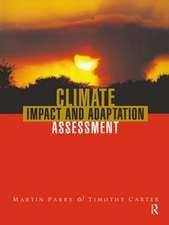Governing Low-Carbon Development and the Economy: Multilevel Environmental Governance for Sustainable Development
Editat de Hidenori Niizawa, Toru Morotomien Limba Engleză Paperback – 3 mar 2014
Based on results of the first phase of the Kyoto Protocol—which requires participating industrial countries to limit their carbon emissions—this book recommends creating a global regulatory regime that would set emission targets for all nations. The authors argue that once these targets and the policies for meeting them are established, countries will be spurred to develop lower-carbon-producing economies. Targets and policies and their implementation would vary from country to country, leading to different types of economies.
The book focuses on the role that local governments would play, how domestic policies would be created and integrated with broader regional or national ones, what shape the political and administrative systems would take, technological innovations related to the policies, and the revenue sources necessary to rebuild infrastructure.
The book discusses experiences in Japan primarily, along with results from collaborative research between Japan and the Republic of Korea and comparative studies between Japan and Germany. The chapters adopt different perspectives, looking at the issue from the discipline of economics as well as a more sociological, neo-institutionalist viewpoint.
The book focuses on the role that local governments would play, how domestic policies would be created and integrated with broader regional or national ones, what shape the political and administrative systems would take, technological innovations related to the policies, and the revenue sources necessary to rebuild infrastructure.
The book discusses experiences in Japan primarily, along with results from collaborative research between Japan and the Republic of Korea and comparative studies between Japan and Germany. The chapters adopt different perspectives, looking at the issue from the discipline of economics as well as a more sociological, neo-institutionalist viewpoint.
Preț: 332.08 lei
Nou
Puncte Express: 498
Preț estimativ în valută:
63.54€ • 66.52$ • 52.58£
63.54€ • 66.52$ • 52.58£
Carte tipărită la comandă
Livrare economică 07-21 aprilie
Preluare comenzi: 021 569.72.76
Specificații
ISBN-13: 9789280812350
ISBN-10: 9280812351
Pagini: 420
Dimensiuni: 152 x 229 x 18 mm
Greutate: 0.48 kg
Editura: Brookings Institution Press
Colecția United Nations University Press
Seria Multilevel Environmental Governance for Sustainable Development
ISBN-10: 9280812351
Pagini: 420
Dimensiuni: 152 x 229 x 18 mm
Greutate: 0.48 kg
Editura: Brookings Institution Press
Colecția United Nations University Press
Seria Multilevel Environmental Governance for Sustainable Development
Notă biografică
Hidenori Niizawa is professor of environmental economics in the School of Economics at the University of Hyogo, Japan. Toru Morotomi is professor of environmental economics in the Graduate School of Economics at Kyoto University, Japan.
Descriere
Based on results of the first phase of the Kyoto Protocol—which requires participating industrial countries to limit their carbon emissions—this book recommends creating a global regulatory regime that would set emission targets for all nations. The authors argue that once these targets and the policies for meeting them are established, countries will be spurred to develop lower-carbon-producing economies. Targets and policies and their implementation would vary from country to country, leading to different types of economies.
The book focuses on the role that local governments would play, how domestic policies would be created and integrated with broader regional or national ones, what shape the political and administrative systems would take, technological innovations related to the policies, and the revenue sources necessary to rebuild infrastructure.
The book discusses experiences in Japan primarily, along with results from collaborative research between Japan and the Republic of Korea and comparative studies between Japan and Germany. The chapters adopt different perspectives, looking at the issue from the discipline of economics as well as a more sociological, neo-institutionalist viewpoint.
The book focuses on the role that local governments would play, how domestic policies would be created and integrated with broader regional or national ones, what shape the political and administrative systems would take, technological innovations related to the policies, and the revenue sources necessary to rebuild infrastructure.
The book discusses experiences in Japan primarily, along with results from collaborative research between Japan and the Republic of Korea and comparative studies between Japan and Germany. The chapters adopt different perspectives, looking at the issue from the discipline of economics as well as a more sociological, neo-institutionalist viewpoint.

















